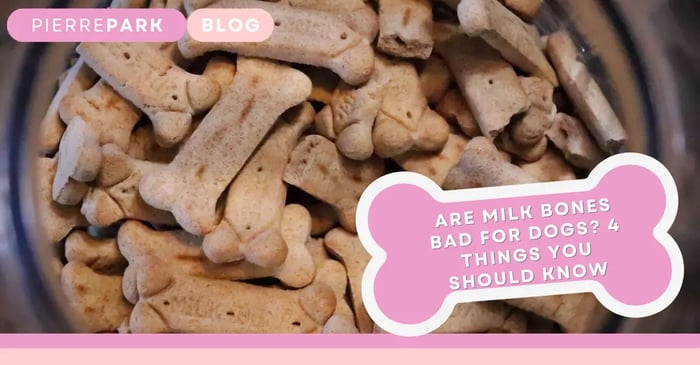Table of Contents
Vet-Approved

This article has been rigorously reviewed and validated by Dr. Annina Müller, med. vet., an accomplished veterinarian who earned her veterinary degree at the University of Bern, specializing in Small Animal Surgery. Her expertise ensures that the advice provided is both current and accurate in the field of veterinary medicine.
Yes, Milk-Bone treats can be bad for dogs, especially if given regularly. While they’re not immediately harmful in small amounts, they contain ingredients that may pose long-term health risks. Although veterinarians often use them, it's important to be aware of what's inside. In this article, we’ll break down these ingredients, explain why Milk-Bones might not be the healthiest option, and suggest natural, high-quality alternatives. By understanding these factors, you can make better choices for your dog's treats.
What Are Milk Bones?
Milk-Bones were introduced in 1908 by the F.H. Bennett Biscuit Company, offering bone-shaped treats made with minerals, meat products, and milk. These treats quickly became popular, and today, many brands have replicated the concept, making Milk-Bones one of the most widely recognized dog treats on the market. Despite their popularity, it's crucial to examine the ingredients to ensure they align with your dog’s health needs.
Milk Bone Ingredients
The ingredients in Milk-Bone treats can vary by brand, but the original Milk-Bone® brand lists wheat flour, ground whole wheat, meat and bone meal, and milk as key components, along with added vitamins and preservatives. Most Milk-Bone-like treats share a similar base of flour, milk, and meat or bone meal. However, it’s important to be aware of these ingredients, as some may not be ideal for your dog's long-term health.
4 Reasons Why Milk Bones Are Not Ideal For Dogs
While Milk-Bones are commonly given to dogs as treats, there are several reasons why they may not be the best choice:
1. Butylated Hydroxyanisole (BHA) Content
BHA, a synthetic preservative found in Milk-Bones, raises significant concerns due to its potential cancer risk. Studies have shown that BHA can be carcinogenic in lab animals, prompting many countries to ban it for human consumption, even though the FDA allows it in small amounts for pets. Because of these serious risks, many pet owners opt for natural, preservative-free alternatives to safeguard their dogs' health and avoid the dangers associated with BHA.
2. Sugar Content
Many Milk-Bone alternatives on the market today contain high levels of sugar, which, while not immediately toxic to dogs, can lead to significant health issues over time. Consistent consumption of sugar can contribute to weight gain, obesity, diabetes, and dental problems in dogs. Even though occasional sugar intake is unlikely to cause harm, it's crucial to be mindful of how much sugar your dog consumes regularly. Healthier treat options that are low in sugar or completely sugar-free are often better choices for maintaining your dog’s overall health.
3. Calorie Content & Filler Ingredients
Milk-Bones are often high in calories due to the presence of filler ingredients like wheat flour. These fillers add bulk but offer little nutritional value, meaning your dog is consuming empty calories. The high calorie content can quickly add up, making it easy to exceed the recommended 10% of daily calories from treats, especially if your dog enjoys treats quickly. For example, Milk-Bone® advises giving only 1 to 3 biscuits per day or one treat per 70 pounds of body weight. For many dogs, especially larger breeds or those prone to weight gain, this limited amount may not be satisfying or sustainable.
4. Other Potential Ingredients
In addition to BHA, Milk-Bones may contain other chemicals and preservatives that could be harmful to your dog’s health. Common ingredients include artificial colors, flavors, and other additives that may contribute to various health issues over time. These chemicals are often included to enhance the treat's appearance, taste, or shelf life but don't provide any real nutritional benefits. To make healthier choices for your dog, it's essential to read ingredient labels carefully and be aware of what to avoid. Cross-referencing these ingredients with lists of harmful substances, like the 15 ingredients to avoid in dog treats, can help ensure that you're giving your dog the safest possible treats.
Dental Health Concerns
Despite dental care claims, Milk Bones provide minimal oral health benefits. Their texture breaks down too quickly to effectively scrape plaque, while their wheat-based ingredients convert to sugars in the mouth, potentially worsening dental issues. According to the Veterinary Oral Health Council (VOHC), truly effective dental products must reduce plaque or tartar by at least 20% - a standard traditional biscuits rarely meet.
For better dental care, look for products with the VOHC Seal of Acceptance, which scientifically demonstrates effectiveness against plaque and tartar. Specialized dental treats with carefully designed textures and beneficial ingredients like chlorhexidine or polyphosphates consistently outperform traditional biscuits in clinical testing. Even Milk-Bone now offers VOHC-approved "Brushing Chews" that are specifically designed for dental care, unlike their original formula.
Healthy Alternative to Milk Bones
Traditional dog treats such as Milk Bones feature complex ingredient lists that raise concerns among pet owners. This is why we developed our hypoallergenic dog treats, which provide a more straightforward approach to pet nutrition.
Our uncomplicated treats remove any uncertainty regarding what you are feeding your pet. With a single natural ingredient, there is no requirement for artificial preservatives or additives.
Our sweet potato treats serve as an excellent example. When properly prepared, they deliver essential vitamins and fiber for dogs. We produce them in small batches using U.S.-grown sweet potatoes, meticulously dehydrating each batch to preserve optimal nutritional value. Most dogs enjoy their natural sweetness.
We support all our products with a satisfaction guarantee, underscoring our commitment to safety and excellence. Our treats harmonize nutrition with flavor, ensuring both health benefits and enjoyment.
 Simple ingredients lead to better treats. 100% natural options, including our Sweet Potato Dog Treats and Butternut Squash Dog Treats, promote pet health without sacrificing taste.
Simple ingredients lead to better treats. 100% natural options, including our Sweet Potato Dog Treats and Butternut Squash Dog Treats, promote pet health without sacrificing taste.





